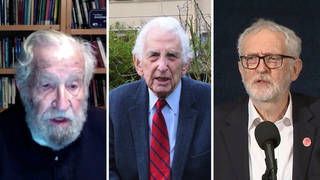
By Amy Goodman with Denis Moynihan
The freedom to communicate and to share has entered a new era. The power promised by this freedom, by the Internet, is immense, so much so that it frightens entrenched institutions. Governments, militaries, corporations, banks: They all stand to lose the control they exert over society when information they suppress runs free. Yet some of the most ardent advocates for the free Internet have become targets of these very institutions, forced to live on the run, in exile or, in some cases, in prison.
Julian Assange is perhaps one of the most recognized figures in the fight for transparency and open communication. He founded the website WikiLeaks in 2007 to provide a safe, secure means to leak electronic documents. In 2010, WikiLeaks released a shocking video taken from a U.S. military attack helicopter, in which at least 12 civilians are methodically machine-gunned to death in New Baghdad, a neighborhood of Baghdad, Iraq. Two of those killed were Reuters journalists. Throughout the massacre, the Army radio transmissions are heard, a combination of grimly sterile orders to “engage” the victims and a string of mocking exchanges among the soldiers, belittling the victims and celebrating the slaughter.
On the heels of the video’s publication, WikiLeaks provided three more major document releases, with hundreds of thousands of classified documents, from official U.S. military communications about the wars in Afghanistan and Iraq, which allowed direct research into, for example, the scale of civilian casualties in those wars. WikiLeaks also revealed hundreds of thousands of U.S. State Department cables, exposing dark, cynical realities of U.S. diplomacy. The secret cables are credited with fueling the Arab Spring, especially the overthrow of the corrupt, U.S.-supported regime in Tunisia.
While the WikiLeaks website managed to protect the identity of the source of these remarkable leaks, an FBI informant pointed the finger at a U.S. soldier, Pvt. Bradley Manning. Serving in U.S. military intelligence in Iraq, Manning was frustrated with U.S. military abuses. He allegedly copied the trove of files and delivered them to WikiLeaks. Manning was arrested and thrown into solitary confinement, in conditions the United Nations labeled “torture.” Manning was court-martialed. After conviction and sentencing to 35 years in an Army prison, Manning announced his intention to transition to a woman, and formally changed her name to Chelsea Manning. One month ago, Manning wrote in an opinion piece in The New York Times, “I believe that the current limits on press freedom and excessive government secrecy make it impossible for Americans to grasp fully what is happening in the wars we finance.”












Media Options